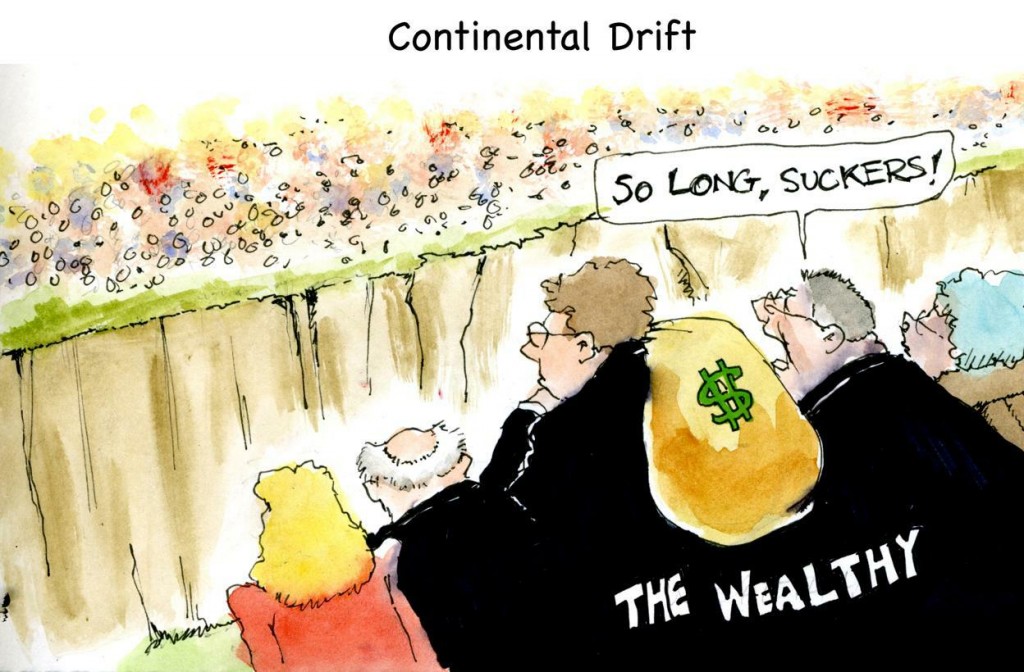Let me buy into the ‘Piketty bubble‘ momentarily, in a tenuous discussion of his book ‘Capitalism in the 21st century’ in relation to the National Health Service.
Since the 1980s, a change in terminology began in England.
Patients in the National Health Service became increasingly known as ‘users’, or as ‘customers’. Throw forwards to 2014, and Chuka Umunna in the UK Labour Party proudly boasts ‘we are all capitalists now’.
Cynics might argue that ‘bringing the lowest out of the poverty’ makes everyone into a capitalist, but I probably wouldn’t talk in such strong terms.
There is a clearly a huge public appetite for a frank discussion on ‘inequality’, on how wealth can be accumulated in the very few and how the super-rich are growing ever distant from those of the bottom of the wealth scale.
Piketty argues that for ‘disruptive’ super events such as the Great Depression or World Wars, inequality would have got far worse.
The most solid part of Piketty’s narrative, as I am sure the author himself would himself concede, is the historical part reviewing what happened in the 19th Century.
And yet, even if the super-élite such as Lord Stewart Wood and Tim Livesey of Ed Miliband’s circle don’t want to buy into it public, a fairer re-distributive taxation system appears not to be on the cards.
Such a fair taxation system is the most parsimonious solution to the ‘funding gap’ presented before the NHS. But to the exasperation of right-wing think tanks the NHS ‘sustainability gap’ has been revealed finally as the Emperor’s New Clothes.
The NHS is a system packed full of brilliant minds but who are collectively underfunded.
And that’s also where the narrative of the right-wing think tanks also runs into problems. Much to the annoyance of the same right-wing think tanks, ‘patients’ have not been successfully rebranded as ‘customers’. We might not be all capitalists now.
In fact, it may be more specific than that. ‘Google’ is the new ‘essential utility company': are we all consumers of multinational corporates now?
And this matter creates a further important ideological discussion, reincarnated for modern times.
It was mooted only yesterday by Prime Minister David Cameron that Labour has resisted all successful transfers of resources into the private sector, such as British Telecom or Royal Mail.
Most members of the Coalition governing parties can bring themselves to mention the ‘P’ word with regards to the NHS, especially with the wealth of a few investors who have benefited handsomely from the initial public offering of the Royal Mail having gone up into the stratosphere.
But the idea of wealth being concentrated in the hands of the few private sector operators goes to the heart of the public displeasure of the outsourcing and privatisation of the NHS through the Health and Social Care Act (2012).
That’s because here it is a matter of life or death. In simple terms, nobody wants to live in a society where a child with a rare genetic disorder, such as juvenile metachromatic leukodystrophy, is denied a potentially life-saving treatment, such as bone marrow transplantation, because of an inability to pay.
This argument also reaches another level, when you consider that all the main political parties are gradually converging on the concept of unified personal budgets for health and social care. While ‘top up payments’ appear to have been ruled out, it is uncertain whether this pretence will be kept up for much longer.
Lord Norman Lamont, not known for his intellectual prowess, claimed last night in his skinny dipping into the Piketty bubble that the only way to achieve ‘equality of opportunity’ would be to abolish inheritance tax. This is clearly as ludicrous as saying that the only way to achieve ‘equality of opportunity’ for alternative qualified (private) providers, or economic parity, would be to abolish the NHS. Oh wait.
The promise that the NHS is free, comprehensive and free at the point of need may be in large part correct, but is clearly not wholly true if very expensive treatments, such as the breast cancer drug Kadcycla, are rationed.
Shareholders and directors of large organisations may have a rather different opinion from those carers on zero-hour contracts who literally don’t know whether they’re coming or going.
There is an economic distinction between the ‘inequality’ arguments and the ‘cost of living’ arguments, but the former may indeed more easily adaptable for Ed Miliband’s new political messaging guru David Axelrod.
In terms of the sheer politics, campaigning on inequalities in health service provision is a big win (or “low hanging fruit”); some other, albeit hugely important, public health topics less so.
Indeed, some should be very afraid of the translated Thomas Piketty narrative, not least certain prominent members of the main political parties.
Piketty has helped to show that economics is not a ‘dismal science’, but is profoundly relevant to our society.
And, for that reason alone, we may not be all customers of the NHS now.



Pingback: Some should be very afraid of Thomas Piketty. W...()